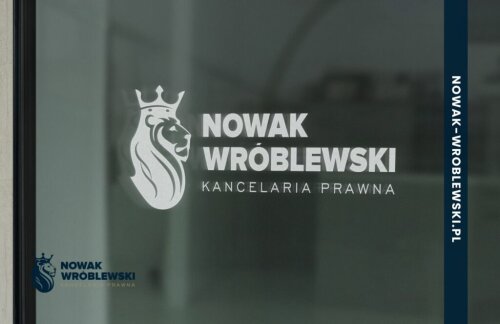Best Employment & Labor Lawyers in Tarnobrzeg
Share your needs with us, get contacted by law firms.
Free. Takes 2 min.
List of the best lawyers in Tarnobrzeg, Poland
1. About Employment & Labor Law in Tarnobrzeg, Poland
Employment and labor law in Tarnobrzeg follows the same nationwide framework as the rest of Poland. The core rules are set out in the Polish Labour Code and related acts, with enforcement mostly handled by national bodies and local courts. In Tarnobrzeg, workers and employers rely on written contracts, clear terms of employment, and access to recourse through regional courts and labor authorities.
Key topics include hiring and termination, working time, leave, wages and overtime, and protections against discrimination. Practical considerations in Tarnobrzeg often involve local employers in the service, manufacturing, and public sectors, where disputes may arise over contract types or wage calculations. Understanding your rights under local procedures helps you protect your position and pursue remedies effectively.
Legal guidance in Tarnobrzeg is enhanced by access to national resources and the local institutions that oversee compliance and dispute resolution. This includes oversight by the Państwowa Inspekcja Pracy (National Labor Inspectorate) and social security matters handled by ZUS (Zakład Ubezpieczeń Społecznych). For formal claims or court actions, Tarnobrzeg residents engage with the local judiciary and regional labor authorities.
2. Why You May Need a Lawyer
- Termination without proper notice or severance in Tarnobrzeg. An employee may be dismissed without lawful grounds or with insufficient notice. A lawyer helps assess whether the dismissal complies with the Labour Code and negotiates or prosecutes appropriate compensation. In practice, this can involve reviewing the firing procedure and calculating owed severance or notice pay.
- Wage underpayment or incorrect overtime compensation. Employers sometimes miscalculate hours or overtime rates. A lawyer can demand correct payment, review timesheets, and pursue back wages through negotiation or court action in Tarnobrzeg.
- Discrimination or harassment at work. If you believe you were treated differently due to age, gender, race, disability, or pregnancy, legal counsel can evaluate evidence, file a complaint, and pursue remedies under the Labour Code and anti-discrimination provisions.
- Misclassification of work arrangements. Some employers misclassify an employee as a contractor or on a different contract type. A lawyer can determine if the arrangement should be treated as a standard employment contract (umowa o pracę) and seek reclassification and back pay if appropriate.
- Remote work and telepraca disputes. If your employer imposes or terminates remote work without proper terms, a lawyer can clarify rights to equipment, reimbursement, and the proper written agreement required by recent practice within Polish labour law.
- Collective redundancies or changes affecting a group of workers. In Tarnobrzeg, a lawyer helps navigate consultation requirements, notification timelines, and potential severance or re-employment terms under applicable collective rules.
- Leave and sickness compliance with ZUS. When sick leave or other approved absences impact pay, a lawyer helps ensure the process aligns with the Labour Code and ZUS rules on benefits and documentation.
3. Local Laws Overview
In Tarnobrzeg, employment matters are guided by national legislation, but you should be aware of two to three key statutes by name, including notable changes where applicable. The following acts are central to most workplace disputes and employment planning in Tarnobrzeg:
- Kodeks pracy (Labour Code) - the principal framework governing employment relationships, working time, leaves, terminations, and employee protections. The original act dates from 1974, and it has been amended many times to address modern workplace realities such as telework and flexible scheduling. The consolidated text is available via official legal information systems that host the current version of the law. ISAP Sejm provides access to the current text and amendments.
- Ustawa o minimalnym wynagrodzeniu za pracę (Act on the minimum wage for work) - sets the lowest legal monthly wage that may be paid to employees. This act is updated periodically through amendments and national budgets, and is relevant for all employers operating in Tarnobrzeg. For current minimum wage figures and changes, refer to the National Labor Inspectorate and official government resources.
- RODO / Ustawa o ochronie danych osobowych (data protection in employment) - governs processing of employee data in hiring, payroll, and personnel management. Poland implements GDPR rules through national law, and employers in Tarnobrzeg must handle personal data in accordance with these provisions, including employee records, payroll data, and disciplinary records. Official guidance and compliance resources are available from government portals and the National Data Protection Authority.
Recent trends across Poland that affect Tarnobrzeg workplaces include formalizing remote work arrangements and increasing focus on data protection in human resources processes. These shifts have prompted more written telework agreements and clearer documentation of duties, equipment, and costs. For practical guidance, consult the National Labour Inspectorate and data protection authorities as you navigate changes.
"Poland enforces employment rights through the Labour Code, with oversight from PIP and judicial remedies in local courts." Source: Państwowa Inspekcja Pracy; ISAP Sejm.
4. Frequently Asked Questions
What is the difference between an employee and a contractor in Poland?
In Poland, an employee works under an employment contract (umowa o pracę) with ongoing obligations. A contractor operates under a civil law contract or mandate, which has different protections and social security terms. The Labour Code generally favors employee status when the work is integrated into the employer’s operations and control is exercised over how work is carried out.
How do I start a wage dispute in Tarnobrzeg?
Start by gathering pay slips, timesheets, and the employment contract. Contact your employer to request payment of due wages in writing. If unresolved, you can file a claim with the local court or appeal to the National Labor Inspectorate for mediation and enforcement guidance.
What is telework and how is it regulated in Poland?
Telework is formalized under a written agreement detailing duties, equipment, and costs. It requires proper documentation and alignment with the Labour Code provisions on working time and health and safety. Flexible arrangements may be adjusted by mutual agreement.
When can I legally terminate my employment in Tarnobrzeg?
Termination depends on the contract type and grounds. For a standard employment contract, statutory notice periods apply, and severance or compensation may be due. An unlawful dismissal claim must be pursued within the statutory timeframe, typically through the local court.
Where can I report unsafe working conditions in Tarnobrzeg?
Unsafe conditions should be reported to the Państwowa Inspekcja Pracy (PIP). PIP can investigate, advise on corrective actions, and impose penalties if safety standards are violated. You can contact PIP through their official channels for guidance.
Is pregnancy protection guaranteed under Polish employment law?
Yes. Polish law prohibits discrimination and provides specific protections for pregnant employees, including protections against unfair dismissal and duties regarding health and safety. A lawyer can help enforce these protections or challenge unlawful treatment.
Do I need a written contract in Tarnobrzeg?
While verbal agreements may be enforceable for certain arrangements, a written contract is strongly recommended. It clearly defines duties, pay, working time, leave, and termination terms, reducing disputes and confusion.
Should I seek a lawyer for a small wage dispute?
Yes. A lawyer can evaluate the case, confirm pay calculations, and determine the best path forward, including potentially favorable settlements or formal claims. Early legal guidance can prevent escalation and save time.
Do I have to go to court for every labor dispute?
No. Many disputes start with negotiations, mediation, or inquiries to PIP. A lawyer can facilitate these processes and recommend the most efficient route for your specific situation in Tarnobrzeg.
Is there a time limit to file a complaint about wrongful dismissal?
Yes. Labour law claims generally have statutory deadlines. An attorney can pinpoint the exact period for your scenario and help you file within those limits to preserve your rights.
What documents should I prepare before meeting a Tarnobrzeg employment lawyer?
Prepare your contract, wage slips, time sheets, payslips, correspondence with your employer, and any relevant notices or disciplinary documents. Having a complete packet speeds up the evaluation process.
5. Additional Resources
- Państwowa Inspekcja Pracy (PIP) - National Labor Inspectorate that oversees compliance with labor laws, handles complaints, and provides guidance to both workers and employers. Website: pip.gov.pl
- Zakład Ubezpieczeń Społecznych (ZUS) - Social security administrator in Poland, including employee contributions and benefit processing. Website: zus.pl
- ISAP Sejm - Official information system hosting the current text of laws, including Kodeks pracy and other employment related statutes. Website: isap.sejm.gov.pl
6. Next Steps
- Clarify your objective and collect all documents related to your employment in Tarnobrzeg (contract, pay slips, correspondence) within 1 week.
- Identify a local employment lawyer in Tarnobrzeg or the Podkarpackie region with specialization in Labour Code matters. Contact at least 2-3 candidates in 2 weeks.
- Schedule a consultation to review your case, discuss options, and outline a plan of action. Allow 1-2 weeks for scheduling and initial review.
- Agree on a fee arrangement and potential costs in writing before proceeding with any formal actions. Expect a written retainer or hourly rate agreement.
- Develop a case strategy, including whether to pursue negotiation, mediation, or court action in Tarnobrzeg. Set realistic milestones and timelines.
- File a formal complaint or claim if necessary, using the appropriate channel (PIP guidance, mediation, or the local court). Timeline varies by method.
- Monitor progress and adjust strategy as needed, with the lawyer providing regular updates and next steps. Reassess costs and outcomes every 4-6 weeks.
For tailored guidance, consult a qualified employment attorney in Tarnobrzeg who can assess your specific facts and help you navigate the local procedures. If you need initial information, you can reference official sources such as the National Labor Inspectorate, ZUS, and Sejm resources to understand your rights before meeting a lawyer.
Lawzana helps you find the best lawyers and law firms in Tarnobrzeg through a curated and pre-screened list of qualified legal professionals. Our platform offers rankings and detailed profiles of attorneys and law firms, allowing you to compare based on practice areas, including Employment & Labor, experience, and client feedback.
Each profile includes a description of the firm's areas of practice, client reviews, team members and partners, year of establishment, spoken languages, office locations, contact information, social media presence, and any published articles or resources. Most firms on our platform speak English and are experienced in both local and international legal matters.
Get a quote from top-rated law firms in Tarnobrzeg, Poland — quickly, securely, and without unnecessary hassle.
Disclaimer:
The information provided on this page is for general informational purposes only and does not constitute legal advice. While we strive to ensure the accuracy and relevance of the content, legal information may change over time, and interpretations of the law can vary. You should always consult with a qualified legal professional for advice specific to your situation.
We disclaim all liability for actions taken or not taken based on the content of this page. If you believe any information is incorrect or outdated, please contact us, and we will review and update it where appropriate.
Browse employment & labor law firms by service in Tarnobrzeg, Poland
Tarnobrzeg, Poland Attorneys in related practice areas.









